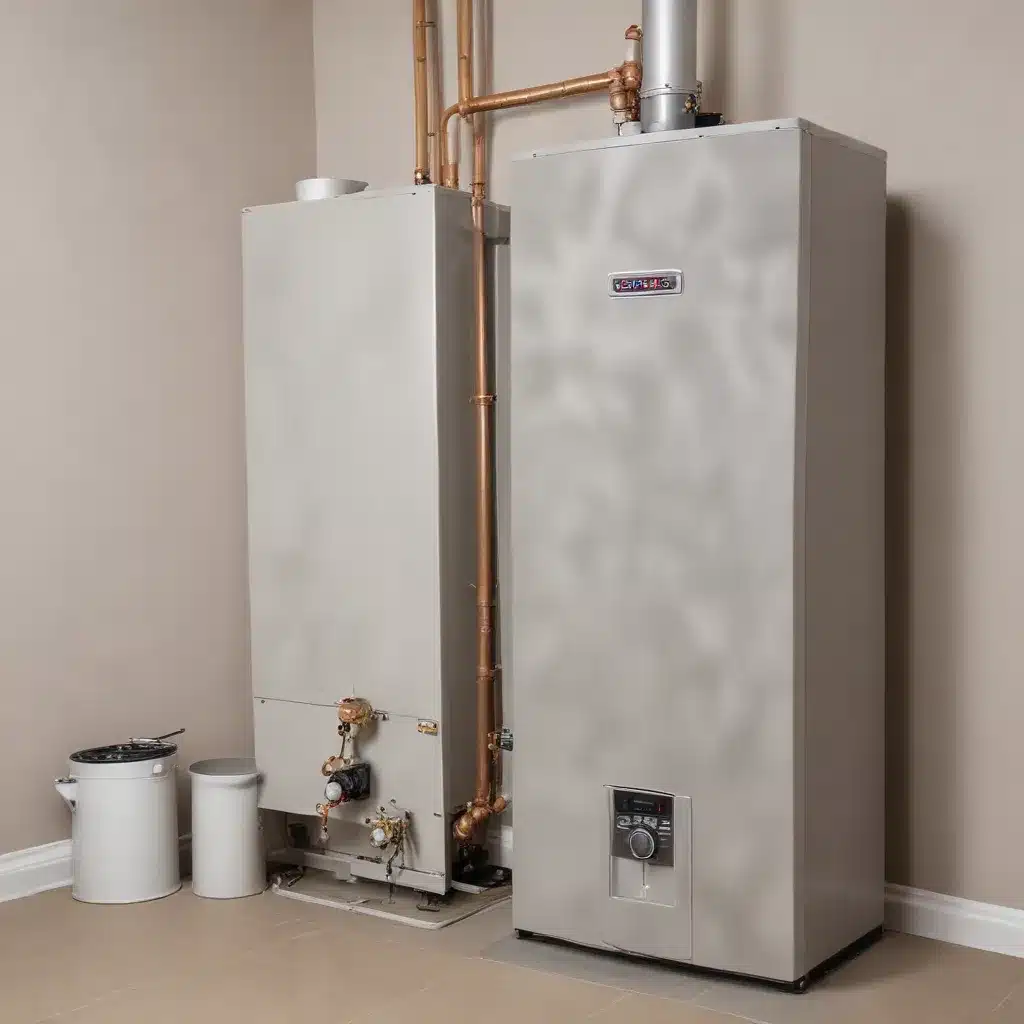
The Benefits of High-Efficiency Boiler Upgrades
As a seasoned expert in plumbing and heating services, I’ve seen first-hand the incredible impact that upgrading to a high-efficiency boiler can have on homeowners’ wallets and the environment. In this comprehensive guide, I’ll dive deep into the practical tips and in-depth insights you need to make an informed decision about modernizing your home’s heating system.
Heating your home is typically the largest energy expense, accounting for around 29% of your utility bills. However, by combining proper equipment maintenance and upgrades with recommended insulation, air sealing, and thermostat settings, you can save up to 30% on your energy bills while reducing environmental emissions. And one of the most impactful ways to achieve these savings is by upgrading to a high-efficiency boiler.
Understanding Boiler Efficiency Ratings
Boiler efficiency is measured by the annual fuel utilization efficiency (AFUE) rating. AFUE is the ratio of a boiler’s annual heat output compared to the total annual fossil fuel energy it consumes. In other words, it’s a measure of how efficiently the appliance converts the energy from fuel into heat for your home.
Older, low-efficiency boilers typically have AFUE ratings ranging from 56% to 70%. This means that for every dollar you spend on fuel, 30-44 cents of that energy is lost up the chimney or through other system inefficiencies.
Mid-efficiency boilers can achieve AFUE ratings in the 80-90% range, representing a significant improvement in efficiency.
High-efficiency boilers, on the other hand, can reach AFUE ratings as high as 98.5%. These models convert nearly all the fuel into useful heat for your home, minimizing waste and maximizing your energy savings.
By upgrading from a 56% efficient boiler to a 90% efficient model in an average cold-climate home, you can cut your fuel bills and carbon dioxide emissions in half. That’s a dramatic difference that both benefits your wallet and the environment.
Factors to Consider When Upgrading Your Boiler
When shopping for a new high-efficiency boiler, there are several key factors to consider:
Sealed Combustion
Look for a boiler with a sealed combustion design, which brings in outside air directly for combustion and exhausts the flue gases directly outside. This avoids the problem of backdrafting, where combustion gases can be introduced into your living space, potentially leading to dangerous situations.
Venting Requirements
High-efficiency boilers often produce acidic exhaust gases that are not suitable for older, unlined chimneys. Make sure to upgrade the venting system to accommodate the new boiler, either by lining the existing chimney or installing a new vent.
Climate and Fuel Costs
In colder climates with higher annual heating costs, it usually makes sense to invest in the highest-efficiency system possible. However, in milder climates, the extra cost to go from 80% to 90% or 95% efficiency may be harder to justify, even though the higher-efficiency units will have lower emissions.
Proper Sizing
Before purchasing a new boiler, have a heating contractor properly size the unit for your home. Oversized equipment will not operate efficiently, so right-sizing the system is crucial. Making energy-efficiency improvements to your home, such as adding insulation or upgrading windows, can allow you to downsize the boiler, further enhancing your savings.
Warranty and Reliability
When comparing boiler models, pay attention to the warranties offered. Choosing a dependable, well-known brand with a strong track record of reliability can give you peace of mind and minimize the risk of costly repairs down the line.
Maintenance and Safety Considerations
Proper maintenance is essential for ensuring the continued efficiency and safe operation of your high-efficiency boiler. Here are some key maintenance tasks to be performed by a qualified heating professional:
All Boiler Systems
- Annual inspection and cleaning of the boiler, venting system, and controls
- Checking for signs of wear or damage, and addressing any issues promptly
Hot Water Boiler Systems
- Flushing the system to remove sediment buildup
- Checking and adjusting the water pressure as needed
- Inspecting and replacing the expansion tank if necessary
Steam Boiler Systems
- Checking the water level and adding water as needed
- Inspecting and cleaning the low-water cutoff device
- Checking the safety valve and replacing it if it’s not functioning properly
Additionally, it’s crucial to ensure that your boiler’s venting system is functioning correctly. Properly vented combustion byproducts, such as carbon monoxide, are essential for your family’s safety. If you suspect any issues with your venting system, contact a qualified heating professional immediately.
The Bottom Line: Savings and Environmental Benefits
Upgrading to a high-efficiency boiler is an investment that can pay dividends for years to come. By improving your home’s energy efficiency and reducing fuel consumption, you’ll not only save money on your utility bills but also significantly lower your environmental impact.
According to the U.S. Department of Energy, upgrading from a 56% efficient furnace or boiler to a 90% efficient model can cut your carbon dioxide emissions by 1.5 to 2.5 tons per year, depending on whether you heat with natural gas or oil.
At DD Plumbing and Heating, we’re committed to helping our customers make informed decisions about their home’s heating systems. If you’re considering a boiler upgrade, our team of experienced professionals is here to guide you through the process, ensure proper installation and maintenance, and help you maximize your energy savings and environmental impact.
Don’t let an inefficient boiler drain your wallet and contribute to unnecessary greenhouse gas emissions. Upgrade to a high-efficiency model today and start reaping the rewards of improved comfort, cost savings, and a greener future.


